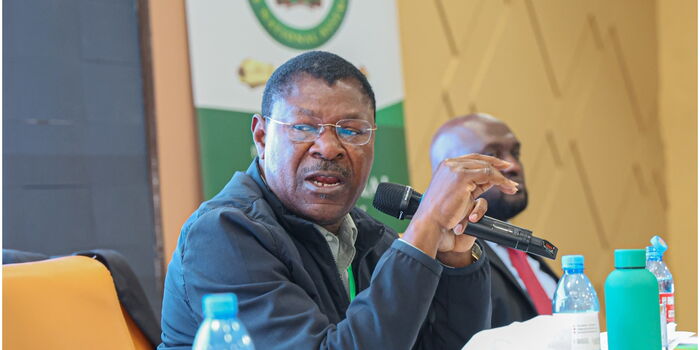The National Assembly has dismissed an attempt to initiate a censure motion against Speaker Moses Masika Wetang’ula.
Clerk Samuel Njoroge explained the reasons for the dismissal of the petition in a letter seen by Kenyans.co.ke, saying the only way the House can discuss the conduct of the Speaker is if a substantive motion is introduced by a sitting Member of Parliament.
“We have perused the Constitution, the Petition to Parliament (Procedure) Act, 2012, and the National Assembly Standing Orders and note that Standing Order 87(1) provides that the conduct of the Speaker can only be discussed through a substantive motion with at least three days’ notice,” the letter stated.
Parliament’s rejoinder will come as a blow to the executive director of the Grassroot Civilian Oversight initiative Laban Omusundi who was keen on seeing Wetang’ula slapped with a censure motion on several grounds.
National Assembly Speaker Moses Wetangula during the opening of the 2025 Mid-Term Retreat for Members of the National Assembly in Naivasha on January 28, 2025.
Photo
National Assembly
The petitioners argued that Wetang’ula engaged in activities that compromised the impartiality and independence expected of a Speaker of the National Assembly.
In their petition, they cited Wetang’ula’s comments made during President William Ruto’s tour of Western Kenya. At the time, the Speaker called out Wiper Party leader Kalonzo Musyoka for questioning Ruto’s maiden bonus payments to sugarcane farmers as he backed the President’s move.
“He (Wetang’ula) uncharacteristically assured the President that the Western region was behind his administration, reiterated that the region was Ruto’s last line of defence, and the frontier of defence against political acrimony from his rivals,” the petitioners argued.
However, the Clerk of the National Assembly insisted the claims were inadmissible since only an aggrieved Member of Parliament can question the Speaker’s conduct.
“The letter underscores the procedural barriers that shield the Speaker from direct censure by the public, reinforcing the legislative requirement that only MPs can initiate such a debate within the House,” a statement from Parliament read.
Wetang’ula has had to deal with an onslaught of criticism not only from ordinary Kenyans but also from members of the National Assembly. On Wednesday, February 12, the Speaker courted controversy by going against a High Court ruling as he declared that Kenya Kwanza remains the majority coalition and Azimio the minority.
While addressing Parliament on Wednesday, February 12, the Speaker gave several reasons why he believed the High Court ruling was flawed, maintaining that the parliamentary leadership would remain intact.
His decision risked a potential rift in the National Assembly, with Azimio-allied Members of Parliament vowing to contest the move and push for the court’s initial ruling to be upheld.
The Azimio Coalition leaders, led by Junet Mohamed, the current Minority Leader, said they would withdraw their members from all-powerful committees, including the House Business Committee (HBC) — a crucial committee within the National Assembly tasked with organising and managing the legislative agenda.
Members of the National Assembly during a previous Parliamentary session.
National Assembly


